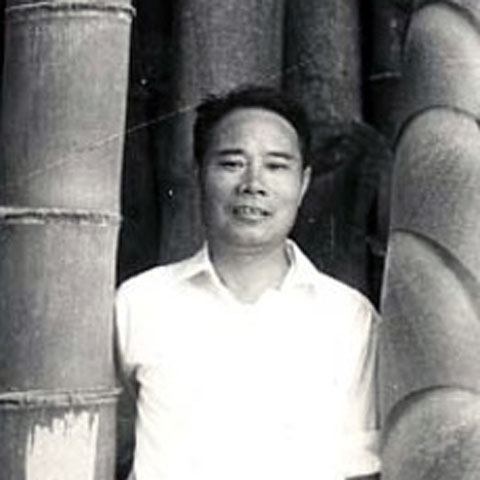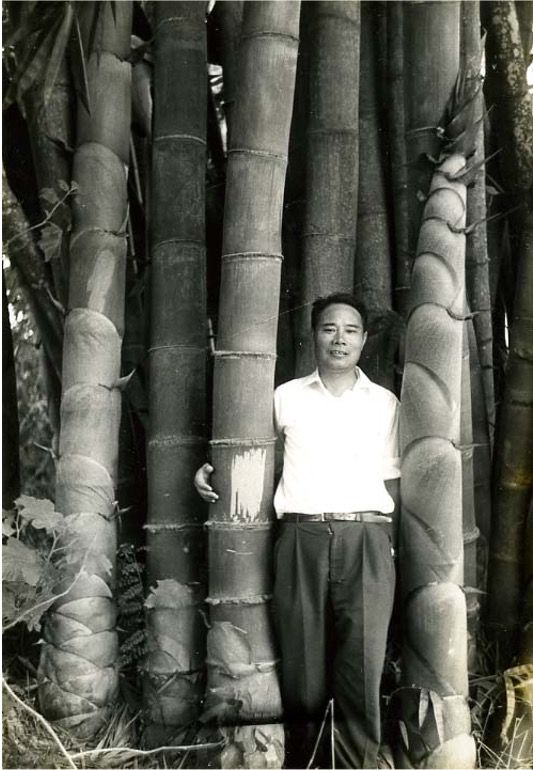
Taiwan

<1915-1995>
Mr. Wei-Chih Lin was born on January 24, 1915, in Ping-Yang County, Zhejiang, China. From a young age, he experienced many hardships. Both his parents passed away before he was 7. His elder brother and sister had also died by the time he finished elementary school. Left alone, Wei-Chih started working as a child trainee to support himself. Luckily, his much older cousin, Professor Wei- An Lin, recognized his potential and took him to Nanjing to continue his studies. As a result, Mr. Lin was able to earn his bachelor’s degree in forest science from National Chengchi University in Nanjing.
Mr. Lin held positions at various agricultural institutions before and after he came to Taiwan in 1948. His bamboo research started when he worked as Associate Research Fellow at Taiwan Forest Research Institute (TFRI) in 1951. Inspired by the book, “Useful Bamboo and Shoots”, and frequent interactions with the author, Hiroichiro Ueda (the first recipient of the World Bamboo Pioneer Award in 2009), as well as the flourishing development of the bamboo industry in Taiwan, Mr. Lin dedicated his entire life to bamboo research. He was quickly promoted to Research Fellow and continued in this role until his retirement in 1984. Concurrently, Mr. Lin also served as a Director at Liou-Guie Experimental Station (1953-1964) and Liou-Guie Branch of TFRI (1965-1969).
Mr. Lin’s research encompassed various aspects of bamboo, including classification, introduction, propagation, and utilization, resulting in the publication of over 50 papers. At the academic level, he made seminal contributions to the discovery of new varieties, and naming and classification of bamboo. Notably, his work such as “Studies on Morphology of Bamboo Flowers” and “The Classification of Subfamily Bambusoideae Plants in Taiwan” earned him an International Scholar recognition in Classification Bamboo Species. In terms of agricultural applications, he innovatively developed horizontal propagation techniques for bamboo. This method, which significantly increased the bamboo plantation area with reduced cultural cost, has been widely adopted by bamboo farmers. On his extensive trips to over 20 countries Mr. Lin investigated bamboo resources, and introduced high-quality foreign varieties back to Taiwan, including “Lao-Nong Giant Bamboo” named by the late President Ching-Kuo Chiang. With the achievements above he was honored with Academic and Career Development Award from Agricultural Association of Taiwan in 1970 and the Innovative Award from Ming-Der Foundation in 1978.
Mr. Lin also led the Bamboo Handicraft and Technology Team on multiple occasions to Africa, Central and South American during 1969-1989. As a pioneer in providing foreign assistance in nurturing bamboo resources and developing bamboo handicraft, Mr. Lin has been repeated praised and commended by presidents of various countries. His contributions to promoting national diplomacy are significant, earning him the title of “Bamboo ambassador”. TFRI established the “Mr. Wei-Chih Lin Memorial Bamboo Garden” to commemorate him by collecting and planting the newly discovered species of bamboo in Shanpin, Liou-Guie Branch, following his passing. In addition to academic research, this Garden offers forest education to the public.
Mr. Lin married Ms. Mei-Yin Wu in 1950, and they raised one son and three daughters, all of whom have pursued successful careers domestically or abroad. Mr. Lin had always appreciated the opportunities offered to him and was committed to providing the same support to others in need.
After Mr. Lin passed away in 1995, his family established the “Wei-Chih Lin Education Fund” to give back to the local community. The fund has benefitted more than 500 financially disadvantaged high school and college students in Ping-Yang County for the past 20+ years.
Today we remember Mr. Lin with the World Bamboo Pioneer Award. His daughter, Lin Na-Sheng is here with us to receive his award.


